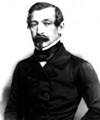
Nanak
1469-1539
Sikh Guru
The son of a merchant he made an extended pilgrimage to Muslim and Hindu shrines in India, returning to the Punjab in 1520.
He became the founding guru of the
Sikh faith, combining Hindu and Muslim beliefs into a
single doctrine.
www link :
Biography
.

Napoleon III
1808-73
Emperor of France
As nephew of Napoleon I he was exiled after 1815. He was involved in two unsuccessful insurrections (1836 and 1840) and returned to France after the 1848
revolution, to be elected President, and to become
Emperor in 1852.
During his prosperous reign Paris was rebuilt, Indo-China was acquired and the Suez
Canal opened. He was defeated by Bismarck in the
Franco-Prussian War and went into exile in England in 1871.
www link :
Biography
.

Gamal Abdel Nasser
1918-70
President of Egypt
As an army officer he was the leading member of a
group which overthrew King Farouk in 1952.
In 1954
he became Prime Minister and then President until his death. He introduced land reform; built the Aswan Dam; followed a neutralistic foreign policy between
the great powers; and provided leadership for the
Arab nationalist movement, which led to two wars
(with Israel, Great Britain and France, 1956, with Israel, 1967) and increasing dependence on the USSR.
www link :
Biography
.

Jawaharlal Nehru
1889-1964
Prime Minister of India
Born in India, schooled in England and graduated at Cambridge University.
Back in India Nehru supported Gandhi's civil disobedience movement and for the next 27 years worked unceasingly for Indian independence, often imprisoned by the British.
Several times president of the Indian National Congress he became India's
first prime minister (1947-64). He established parliamentary government and
became a leader of nonalignment in world affairs.
www link :
Biography
.

Kwame Nkrumah
1909-72
President of Ghana
He wrote 'Towards Colonial Freedom' in 1947 in opposition to British rule, and later organized a
non-cooperation movement in Ghana.
After independence (1957) he became first President of
the Ghana republic (1960). He declared a one-party
state and was deposed in 1966 by the army while on a
visit to China.
www link :
Biography